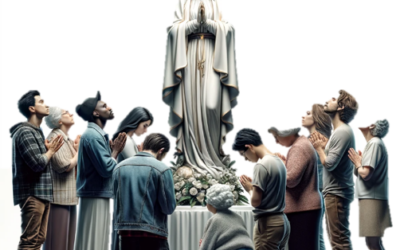In Roman Catholicism, the Mass is equivalent to The Lord’s Supper, the communion offering. The word “mass” is derived from the Latin missa. The mass is a series of rituals centered around the communion supper. It is also called the Eucharistic Supper. According to the New Saint Joseph Baltimore Catechism, vol 2, question 357, “The mass is the sacrifice of the new law in which Christ, through the Ministry of the priest, offers himself to God in an unbloody manner under the appearances of bread and wine. The mass is the sacrifice of Christ offered in a sacramental manner . . . the reality is the same, but the appearances differ.” Question 358 asks, “What is a sacrifice?” The answer given is, “A sacrifice is the offering of a victim by a priest to God alone, and the destruction of it in some way to knowledge that he is the creator of all things.” From the Baltimore Catechism, we can conclude that the mass is the offering of Christ by a priest.
According to Roman Catholicism, Christ instituted the Mass when he said, “This is my body,” (Matt. 26:26) and “This is my blood,” (Matt. 26:28). Furthermore, Roman Catholicism teaches that when Jesus said, “Do this in remembrance of me,” he gave the apostles and hence his future priests the power to change bread and wine into his body and blood, (Baltimore Catechism, Vol. 2, Q. 354). Therefore, during the ceremony of the Mass during the part of the liturgy known as the consecration, the priest changes of bread and wine into Christ’s body and blood (Catechism of the Catholic Church, 1105).
In checking out the Catechism of the Catholic Church (CCC)., In the Catholic Encyclopedia, and The Council of Trent, we find the following: The Eucharist is referred to in several ways.
- As a sacrifice
- “the holy sacrifice of the Eucharist” (CCC 1055) and “the Eucharist is also a sacrifice” (CCC 1365).
- As a divine sacrifice
- “For it is in the liturgy, especially in the divine sacrifice of the Eucharist, that “the work of our redemption is accomplished,” (CCC 1068).
- As a representation of the sacrifice of Christ
- “The Eucharist is thus a sacrifice because it re-presents (makes present) the sacrifice of the cross” (CCC 1366).
- Is ‘one single sacrifice’ with Christ’s sacrifice
- “The sacrifice of Christ and the sacrifice of the Eucharist are one single sacrifice” (CCC 1367).
- It is the same sacrifice of Christ
- “And since in this divine sacrifice which is celebrated in the Mass, the same Christ who offered himself once in a bloody manner on the altar of the cross is contained and is offered in an unbloody manner” (CCC 1367).
- It is propitiatory (removes the wrath of God)
- “…this sacrifice is truly propitiatory” (CCC 1367).
- To all who deny its propitiatory nature Trent pronounces anathema
- “If any one saith, that the sacrifice of the mass is only a sacrifice of praise and of thanksgiving; or, that it is a bare commemoration of the sacrifice consummated on the cross, but not a propitiatory sacrifice; or, that it profits him only who receives; and that it ought not to be offered for the living and the dead for sins, pains, satisfactions, and other necessities; let him be anathema.” (Trent: On the Sacrifice of the Mass: Canon 3);
- It is called the sacrifice of Christ which is offered via the priest’s hands
- “The sacrifice of Christ the only Mediator, which in the Eucharist is offered through the priests’ hands,” (CCC 1369).
- It is capable of making reparation of sins
- “As sacrifice, the Eucharist is also offered in reparation for the sins of the living and the dead” (CCC 1414).
- It is to be considered a true and proper sacrifice
- “The Church intends the Mass to be regarded as a ‘true and proper sacrifice'” (The Catholic Encyclopedia, topic: “Sacrifice of the Mass”).
Is the Mass a re-sacrifice of Christ?
Roman Catholics are quick to say that the Eucharist is not a re-sacrifice of Christ. They want to make it clear that Christ was offered once and for all and that the Mass is not a re-sacrifice but a “re-presentation” of the sacrifice. We certainly do not want to misrepresent Roman Catholic theology, but we must ask how it is possible for the Mass not to be a re-sacrifice of Christ when the Mass is called a divine sacrifice (CCC 1068) that is done over and over again. We are told that “the sacrifice of Christ and the sacrifice of the Eucharist are one single sacrifice”; (CCC 1367); that it is an unbloody offering that is propitiatory (CCC 1367); that it can make reparation of sins (CCC 1414); and is to be considered a true and proper sacrifice (The Catholic Encyclopedia, topic: “Sacrifice of the Mass”). We must conclude that it is a sacrifice that occurs over and over again, and since it is said to be a true and proper sacrifice that is propitiatory, then logically, it must be a re-sacrifice of Christ. If it is not, then how can it be called a sacrifice of Christ? Also, how could it be propitiatory if it is not a sacrifice of Christ since it is Christ’s offering on the cross that is itself propitiatory?
- Heb. 2:17, “Therefore, He had to be made like His brethren in all things, that He might become a merciful and faithful high priest in things pertaining to God, to make propitiation for the sins of the people.”
- 1 John 2:2, “and He Himself is the propitiation for our sins; and not for ours only, but also for those of the whole world.”
Biblical Response
We risk the Roman Catholic saying that the biblical response to their position is a response to a straw man. Typically, the Roman Catholic will say that the Mass is not a re-sacrifice. But it is difficult to conclude otherwise when we examine what the official Roman Catholic documents say. Therefore we surmise that if it walks like a duck, quacks like a duck, and looks like a duck, it must be a duck. Likewise, if the Mass is said to be a sacrifice of Christ and is repeated, then we must conclude that it is a continuing sacrifice, a re-sacrifice of Christ, since the Catholic Church says that this very sacrifice is propitiatory (removes the wrath of God); and it is only the actual sacrifice of Jesus that can accomplish propitiation.
The Bible tells us plenty about the sacrifice of Christ. Please consider the following verses:
- Sacrifice offered once
- Heb. 7:26-27, “For it was fitting that we should have such a high priest, holy, innocent, undefiled, separated from sinners and exalted above the heavens; 27 who does not need daily, like those high priests, to offer up sacrifices, first for His own sins, and then for the sins of the people, because this He did once for all when He offered up Himself.”
- Heb. 9:28, “So Christ also, having been offered once to bear the sins of many, shall appear a second time for salvation without reference to sin, to those who eagerly await Him.”
- Heb. 10:1-12, “By this will we have been sanctified through the offering of the body of Jesus Christ once for all, 11 And every priest stands daily ministering and offering time after time the same sacrifices, which can never take away sins; 12 but He, having offered one sacrifice for sins for all time, sat down at the right hand of God.”
- Sacrifice repetition of no value
- Heb. 10:1, “For the Law, since it has only a shadow of the good things to come and not the very form of things, can never by the same sacrifices year by year, which they offer continually, make perfect those who draw near.”
- Heb. 10:11, “And every priest stands daily ministering and offering time after time the same sacrifices, which can never take away sins.”
We can see that the Bible tells us Christ offered himself once, and that there is no need for repetition of his sacrifice. The failure of the Roman Catholic Church has been to distort the biblical doctrine of the Lord’s Supper into a constant and repetitious sacrifice of Christ. It should be plain to the reader that the Roman Catholic position is not only unbiblical but anti-biblical.
We at CARM humbly request that the Roman Catholic not put his or her faith in the Mass but instead turn to the one and true sacrifice of Christ, by faith, and look to Jesus alone and not a human institution that offers a repetitious sacrifice. We are made right by the blood of Christ–not by the offering of a Roman Catholic priest who changes the bread and wine into the literal body and blood of Christ.
- 1 John 1:9, “If we confess our sins, He is faithful and righteous to forgive us our sins and to cleanse us from all unrighteousness.”
- Rom. 5:9, “Much more then, having now been justified by His blood, we shall be saved from the wrath of God through Him.”
- Rom. 5:1, “Therefore having been justified by faith, we have peace with God through our Lord Jesus Christ.”





